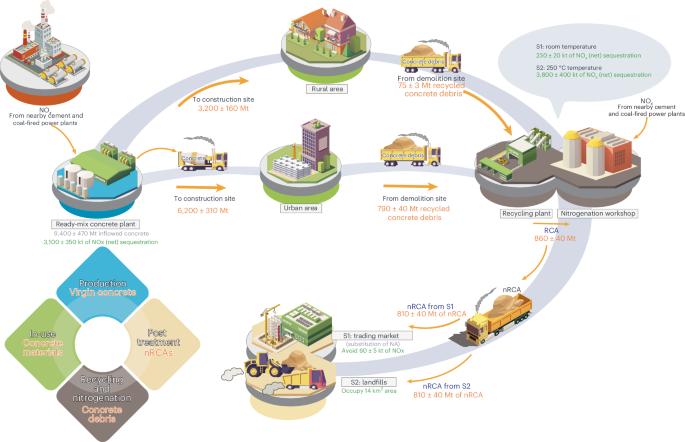Contribution of concrete nitrogenation to global NOx uptake
引用次数: 0
Abstract
The renewal and expansion of the built environment within the context of rapid urbanization are imposing new benchmarks for resource management, particularly concerning the billions of tons of consumption and waste generation of concrete materials. The commercialization of carbonation in cementitious materials is underway, opening up possibilities for nitrogenation that has been well documented in recent experimental studies. Here we further utilize a dynamic model to estimate the mitigation potentials of NOx by the promotion of concrete nitrogenation in a global urbanization scenario, projecting its global health and economic benefits toward 2050. Our analysis reveals that concrete nitrogenation can theoretically contribute to a reduction in NOx emissions by approximately 3.4–6.9 Mt—or 6–13% of global industry-related emissions—in 2021. The cumulative economic potential is projected to exceed 150–160 trillion USD, accompanied by a NOx mitigation of 131–384 Mt between 2021 and 2050, equivalent to 75–260 years potentially lost to premature death and reduced quality of life (estimated in terms of disability-adjusted life years). However, both carbonation and nitrogenation techniques rely on the availability of alkaline reactive components within the material, leading to competition. Although significant uncertainty remains, our comparison reveals that, in most regions, promoting the commercialization of nitrogenation exhibits higher feasibility and prioritization over carbonation in relation to both economic and environmental benefits. Globally, concrete materials are widely used to build urban settings, resulting in massive waste. The authors propose scenarios of industrial-scale application of concrete nitrogenation, to use concrete debris in cities to mitigate NOx emissions.

混凝土氮化对全球氮氧化物吸收的贡献
在快速城市化的背景下,建筑环境的更新和扩展对资源管理提出了新的要求,尤其是在数十亿吨混凝土材料的消耗和废物产生方面。水泥基材料碳化的商业化正在进行中,这为氮化提供了可能性,最近的实验研究也充分证明了这一点。在此,我们进一步利用动态模型来估算在全球城市化背景下,通过推广混凝土氮化来缓解氮氧化物的潜力,并预测其在 2050 年前的全球健康和经济效益。我们的分析表明,从理论上讲,到 2021 年,混凝土制氮可减少约 340 万至 690 万吨的氮氧化物排放量,占全球工业相关排放量的 6%至 13%。预计累积经济潜力将超过 150-160 万亿美元,2021 年至 2050 年间可减少 1.31-3.84 亿吨氮氧化物,相当于因过早死亡和生活质量下降(按残疾调整寿命年数估算)而可能损失的 75-260 年。然而,碳化和氮化技术都依赖于材料中碱性活性成分的可用性,从而导致竞争。尽管仍存在很大的不确定性,但我们的比较显示,在大多数地区,就经济和环境效益而言,促进氮化技术的商业化比碳化技术更具可行性和优先性。在全球范围内,混凝土材料被广泛用于城市建设,造成大量浪费。作者提出了混凝土氮化的工业规模应用方案,利用城市中的混凝土废弃物来减少氮氧化物的排放。
本文章由计算机程序翻译,如有差异,请以英文原文为准。
求助全文
约1分钟内获得全文
求助全文

 求助内容:
求助内容: 应助结果提醒方式:
应助结果提醒方式:


